#Political nonfiction
Text


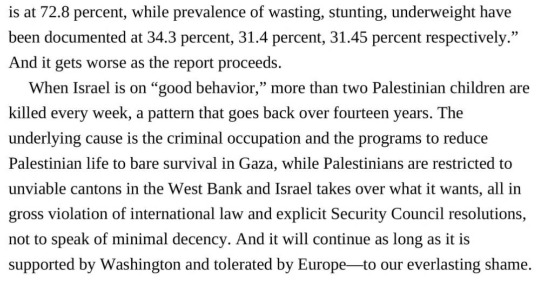
— On Palestine: Noam Chomsky, Ilan Pappé (2015)
#free gaza#gaza#free palestine#On Palestine#Noam Chomsky#Frank Barat#Palestine#Israel#Palestinian rights#free Palestine#free Gaza#politics#atypicalreads#nonfiction#zionism#history#philosophy#political#nsnv#unrwa#statistics#breaking international law
1K notes
·
View notes
Text
My top 10 nonfiction reads of 2023 (the asterisked ones are in French with no translation as of yet) :
Belle Greene, Alexandra Lapierre
The Indomitable Marie-Antoinette, Simone Bertière
Reporter: A Memoir, Seymour Hersh
Red Carpet: Hollywood, China and the Global Battle for Cultural Supremacy, Erich Schwartzel
Empire of Pain: The Secret History of the Sackler Dynasty, Patrick Keefe
Servir les riches, Alizée Delpierre*
La Comtesse Greffulhe : L’ombre des Guermantes, Laure Hillerin*
Le Courage de la nuance, Jean Birnbaum*
The Book Collectors of Daraya, Delphine Minoui
Flowers of Fire: The Inside Story of South Korea's Feminist Movement, Hawon Jung
#book recs#i haven't finished the last one yet but it's been good so far! i really admire these women's resilience and solidarity#some inspiring stories of political activism + insight into aspects of korean history i didn't know about#i wanted to do a half-fiction half-nonfiction list like last year but i've read mostly disappointing fiction this year :(#my favourites were probably kivirähk's the man who spoke snakish & catherynne valente's radiance; though it wasn't as good as orphan tales#i'm reading jacques abeille's les jardins statuaires right now and it's quite frustrating because on the one hand#it's well-written and interesting with original worldbuilding. on the other i'm 300 pages in and there have been#2 female characters. the purpose of both (so far) was to have sex with the male protagonist and only 1 has a name#which makes the read feel less original and more ''same old shit as far as i'm concerned''
266 notes
·
View notes
Text
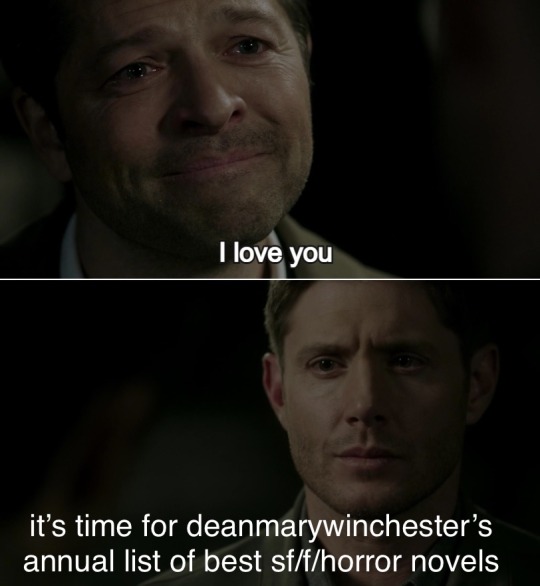
previous years: 2022, 2021 / list of worst sf/f/horror
the bangers were BANGING this year, I kept mentally readjusting my top 5 list every time I read something good so the honorable mentions are extremely honorable this year. I hope you read anything that sounds good from this list and tell me about it!
top 5:
chain gang all stars by nana kwame adjei-brenyah: when I say that this book is like the hunger games for adults, I’m not making a glib comparison between two books about fighting to the death, I’m saying that I haven’t felt so intensely about a book since I stayed up late to tear through the hunger games and sob about it when I was thirteen. this book is satire as real and devastating as I’ve ever read, with action scenes that feel like they’re being dripped directly into my hindbrain and a unique and believable love story. put it on hold at your library literally RIGHT now.
the actual star by monica byrne: about a post-climate catastrophe utopian society built around a religion started by a teenage girl in 2012 based on mayan traditions, and also about the teenage girl, and also about the maya. this book made me crazy because the future society felt real enough to touch, with its radical openness and collectivity solving problems that exist today but causing new ones that are totally novel and meaty and interesting to dig into. read it if you’re interested in different ways of being.
the spear cuts through water by simon jiménez: really, REALLY good, fresh, original epic fantasy. jimenez picks a few perspectives to stick to but hops fluidly into bystanders’ brains to give you their perspectives, so even background characters feel fleshed-out and no one’s pain is dismissed as a side effect of heroic battles or whatever. highly recommended if you like framing narratives and stories about stories, and like epic fantasy but wish it wasn’t mostly about finding acceptable enemies to slaughter with cool swords
the dispossessed by ursula k. le guin: I love how much this book is about hope as clear-eyed commitment to the boring and difficult work of a brighter and necessary future. sometimes the work of the glorious anarcho-communist revolution is leaving your university post and romantic partner for months at a time to dig irrigation ditches so nobody starves when there’s a drought. read this book for diplomatic conniving, a clash of values between a capitalist planet and its dissident moon, and hope.
imperial radch trilogy and its spinoffs by ann leckie: what if you were built to be a weapon of the empire, a serene sentient battleship with thousands of human bodies all containing your consciousness, and you lost all bodies but one and had to figure out how to be a person, singular and alone? what if you were a 19th century british military officer and you slept for a thousand years into the decline of the empire? what if you were grown in a vat to be a facsimile of human and then told off for eating all your siblings even though eating them was SO interesting? what then. leckie’s prose is incisive and funny, her unreliable narrators are wonderful, and her stories are intimate even though the backdrops are insanely huge. 👍.
honorable mentions:
house of leaves by mark z. danielewski: guys? anyone hearda this one? anyway. Something Is Wrong With This House horror with themes of storytelling and grief. recommending that you slam this book as fast as possible like I did so you can hold all its layers in your head at once.
the lathe of heaven by ursula k le guin: i thought I didn’t like ursula k le guin, and then I read this book, went OH and immediately devoured the hainish cycle. im so sorry miss ursula. this book about a hapless pacific northwesterner whose therapist is making him dream different realities into being is so sharp and sly and funny. themes of choices, ends and means.
he who drowned the world by shelley parker-chan: I liked the prequel to this addition to the radiant emperor duology. I LOVED this book. parker-chan has invented new and exciting modes of fucked-up codependency and im obsessed. historical light-fantasy with themes of ideals vs what it takes to reach them, gender, and regret.
babel by r. f. kuang: found the didacticism of this book annoying, but i really loved the concept of this novel and the way it slowly ratchets up the stakes. this novel is for people who want to smash the fun of the magic school genre against the reality of universities’ complicity in the imperial machine.
piranesi by susannah clarke: im late to this book but it’s such a weird little gem. peaceful yet unsettling. a man takes care of an endless house with an ocean inside it until he realizes the house is stealing his memories. themes of memory and devotion.
hell follows with us by andrew joseph white: I can only read YA these days if it’s a reread or if it’s genuinely good and really really strange. this is that. weird gory fantasy about a trans teen who escapes his militarized post-apocalyptic christian cult and finds himself turning into something Different. my only gripe is that he uses 2023-perfect language to describe transness and I think he should be inventing genders weve never even thought of. such is YA.
some desperate glory by emily tesch: a rolickin’ good space opera time with terrible women <3. a thriller about how the golden child of her isolated human-supremacist space station cult deprograms and the consequences of it. this feels like a grown-up SPOP until the theoretical physics gets involved. big fan
the library of mount char by scott hawkins: this book is harrow the ninth in suburbia until it becomes a more macabre version of the absurdity of the gomens apocalypse. God raises his children, sometimes brutally, to hone their powers in a neighborhood that mysteriously keeps out outsiders. came for the dysfunctional mess of the god-children and now I can never look at a grill the same way
runners up:
bunny by mona awad: books that make you WISH you were in mona awad’s MFA program where she must have been having a terrible time. the weird one out in an MFA program accepts overtures into the unbearable rich-girls’ clique to find out what they’re Up To. themes of aimlessness and the intersection of class with the art world
camp damascus by chuck tingle: have you ever wished that you were simply too autistic to be successfully demonically brainwashed into not having gay thoughts? horror-flavored thriller that was just fun
light from uncommon stars by ryka aoki: this author put a bunch of genres in a blender and came up with something fun and surprisingly cozy. an immortal woman must sell violinists’ souls to the devil in exchange for their fame, or he’ll drag her to damnation instead. there might be aliens and coffeeshop romance involved. definitely a blender.
the fragile threads of power by v. e. schwab: if you haven’t read a darker shade of magic and you like tightly paced high fantasy and historical fantasy elements, political intrigue, and pirates, read that first. if you have, there’s more now! lila bard are you free on thursday when I am free
the library of the dead & our lady of mysterious ailments by t. l. huchu: a teenage girl provides for her family in soft-apocalypse magic edinburgh with a job carrying messages from ghosts to their living relatives. an ongoing mystery series about the intrigues she uncovers among the dead.
severance by ling ma: this books is on the list of media that is the terror to me: it's about an apocalyptic disease that makes people reenact their routines mindlessly until they collapse. intimate apocalypse novel with themes of late capitalist malaise.
ocean’s echo by everina maxwell: i didn't really like winter's orbit because i'm just not a romance guy, but this second novel stands alone and the romance is more insane and less of the entire point of the novel. (also it's between essentially Discworld's Carrot and Moist Von Lipwig, which is. really something.) in the Space Military, a buttoned-up mind controller must pretend to bend a socialite with illegal mind-reading powers to his will. what if fake relationship but the relationship they have to fake is "brain linked master/servant pair."
the murderbot diaries by martha wells: novellas about a misanthropic security android who jailbroke itself in order to watch tv. the name "murderbot" is a joke but it very much did kill people <3 themes of paranoia and outsiderhood, corporate wrongdoing, repentance, and trust
black water sister by zen cho: zen cho is good at any kind of fantasy she writes, including this, her first modern fantasy novel. a closeted lesbian has to move in with her family in malaysia after college in the US, only to discover that her dead grandmother has some unfinished business involving a local goddess and a conniving real estate developer. themes of family, gender, and place.
the way inn by will wiles: a man who’s paid to pretend he’s other people to attend conferences in their place gets trapped in an endless Marriott. has the sharp humor of a colson whitehead corporate satire until it becomes more straightforwardly horror-flavored.
#yearly book roundup#reading tag#my posts#it was a good year for my like. ideological and political development and im so serious that some of these books helped almost as much as#the nonfiction i read#reading about totally different and new ways of structuring society and morality are an antidote against knee-jerk reactionary thinking#like. 'life doesnt work like that' okay but what if we could make life work like that? what would it take? why does life work like THIS now#you know. anyway stream the dispossessed and the actual star especially
108 notes
·
View notes
Text
Gender/Fucking: The Pleasures and Politics of Living in a Gendered Body by Florence Ashley
goodreads

Featuring critical essays, erotica, and stitched-up memories, Gender/Fucking explores sexual arousal as a site of knowledge about the self and world.
Taking the idea of intellectual masturbation a bit too literally, Florence Ashley draws on their experiences as a transfeminine activist, academic, and slut to interrogate what it means to live in a gendered body in our difficult yet occasionally loving world. With personal essays about the fetishization of trans bodies, recovering from surgery, and losing hope, Florence’s collection celebrates the queer messiness of sex and identity.
Through the embrace of its raw and lyrical prose, Gender/Fucking invites the reader into the intimate world of academic smut to ask what it means to be horny on main in a sex-negative world—and what power it might hold.
Mod opinion: I haven't heard of this book before, but it sounds really, really interesting!
#gender/fucking#gender/fucking: the pleasures and politics of living in a gendered body#florence ashley#polls#trans books#trans lit#trans literature#lgbt books#lgbt lit#lgbt literature#trans woman#own voices#nonfiction#politics#to read
26 notes
·
View notes
Text
Often when discussing treaty rights with whites, Indians find themselves being told that “We gave you the land and you haven’t done anything with it.” Or some commentator, opposed to the welfare state remarks, “We gave the Indians a small piece of land and then put them on the dole and they are unable to take care of themselves.”
The truth is that practically the only thing the white men ever gave the Indian was disease and poverty. To imply that Indians were given land is to completely reverse the facts of history.
- Custer Died For Your Sins by Vine Deloria Jr.
#book quote#custer died for your sins#vine deloria jr#nonfiction#history#politics#quote#quotes#booklr#bookblr
574 notes
·
View notes
Text
For example, we can imagine ourselves participating in good faith conversations on a new social media platform about a particular social issue. This platform is structure, of course, by designers employed by the company owners, who build and manage algorithms that direct the traffic of posts and courage consumer engagement. As we talk on this platform, its feature begin to affect our behavior: simpler takes attract comments and shares, affecting what people say on the platform. The tech-company owners get the lion's share of the revenue generated by the site's traffic, driven by our conversations, and a small number of site participants get the lion's share of attention directed the activity on the platform. An elite emerges.
It would be a mistake, however, to understand everything that happens on the platform as a process orchestrated by the elites. They are its results, like the platform's unequal distribution of the profit and attention itself. Elites do often make the environment worse and block solutions, but to blame the problem of elite capture entirely on their moral successes and failures is to confuse effect for cause. The true problem lies in the system itself, the built environment and rules of interaction that produced the elites in the first place.
— Olúfẹ́mi O. Táíwò, Elite Capture: How the Powerful Took Over Identity Politics (and Everything Else)
#bolding is mine. italics are source#Olúfẹ́mi O. Táíwò#elite capture#spilled ink#quotes#socialism#communism#politics#political theory#good book. devoured it in a couple of days 🤙#it reads more like setting up the basis of an analytical framework for which to analyze politics rather than analyzing from said framework#on its own (which is how i originally read the title/desc)#but its worth the read i think#suuuper short too. i think he loses the plot a little at the end but like. its fine. would be 4/5 if i rated nonfiction
43 notes
·
View notes
Text

Taken from 'How To Stay Sane In An Age Of Division' by Elif Shafak.
#booklr#books#bookblr#book#quotes#book quotes#quotations#quote#book quote#how to stay sane in an age of division#elif shafak#non fiction#nonfiction#essays#politics
37 notes
·
View notes
Text
i have read TWO (short, nonfiction, basically "lefty articles writ long") books in the past week, which is a big deal for me bc my brain has been atrophying for some time now
#nickel and dimed by barbara ehrenreich#and#elite capture by olufemi taiwo#btw#gonna keep reading more political and nonfiction works! feels good!
7 notes
·
View notes
Text
The Philippines is one of the most dangerous places in the world for journalists, but the threat, in my mind at least, was out in the provinces, where private armies and local officials operated with impunity. I was working for the largest television network and the highest circulated broadsheet in Manila. I also assumed, correctly as it turned out, that the assassination of a onetime national treasure would be more trouble than it was worth.
from Some People Need Killing: A Memoir of Murder in My Country, by Patricia Evangelista
#quotes#some people need killing#patricia evangelista#nonfiction#journalism#history#politics#crime#books#filipino history#filipino politics#filipino literature#filipino author
14 notes
·
View notes
Text
Urging women to refine men of ‘loose morals or impertinent behaviour’ by their ‘cold civility’ did more than aim to improve men’s morality; the ultimate goal was regulating women’s behaviour. Placing the task of controlling men’s manners, along with their own, on women’s shoulders was thus a strategic move, since women could only achieve this supposed position of power by assuming the normative position of demure femininity offered to them in didactic literature. This process of normalisation ultimately aimed at isolating women from power by producing ideal femininity—soft, non-rational, and essentially submissive. Therefore, by assuming the refining power over men, so condescendingly offered to them, women simultaneously relinquished their possibility of achieving autonomous agency.
Soile Ylivuori, from Women and Politeness in Eighteenth-Century England: Bodies, Identities, and Power
#soile ylivuori#women and politeness in eighteenth century england: bodies identities and power#nonfiction#essays#on gendering#on femininity#2022 reads
94 notes
·
View notes
Text

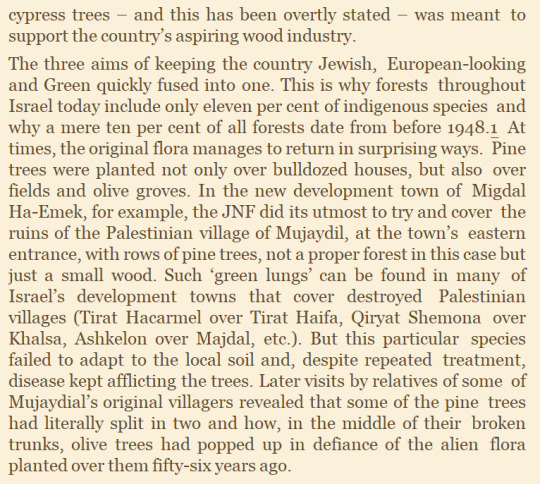
The Ethnic Cleansing of Palestine - Ilan Pappé (2006)
#the rejoicing that must have occurred - i can imagine word spread fast#zionists probably took this as a personal attack by nature. good.#The Ethnic Cleansing of Palestine#Ilan Pappé#Palestine#Israel#Free Palestine#Free Gaza#ethnic cleansing#zionism#nsnv#colonialism#atypicalreads#politics#history#state of israel#nonfiction#olive trees#Ilan Pappe#mujaydil#conifers#natural flora#indigenous#cypress#pine#trees#migdal ha-emek#jnf#jewish national fund#green lungs
159 notes
·
View notes
Text
"Instead of imagining a world without work that will never come to pass, we should examine the ways historical struggles posited an alternative relationship to work and liberation, where control over the labor process leads to greater control over other social processes, and where the ends of work are human enrichment rather than abstract productivity. furthermore, these struggles point toward the only vehicle for a liberation from capitalism: the composition of a militant struggling class that attacks capital in all its manifold domination, including the technological".
Breaking Things at Work: The Luddites Are Right About Why You Hate Your Job by Gavin Mueller
#book quotes#currently reading#capitalism#luddism#political economy#breaking things at work#gavin mueller#history#political history#labor#labor relations#class struggle#marxism#technology#politics#verso books#book rec#nonfiction#r/#book recommendations#writings
38 notes
·
View notes
Text
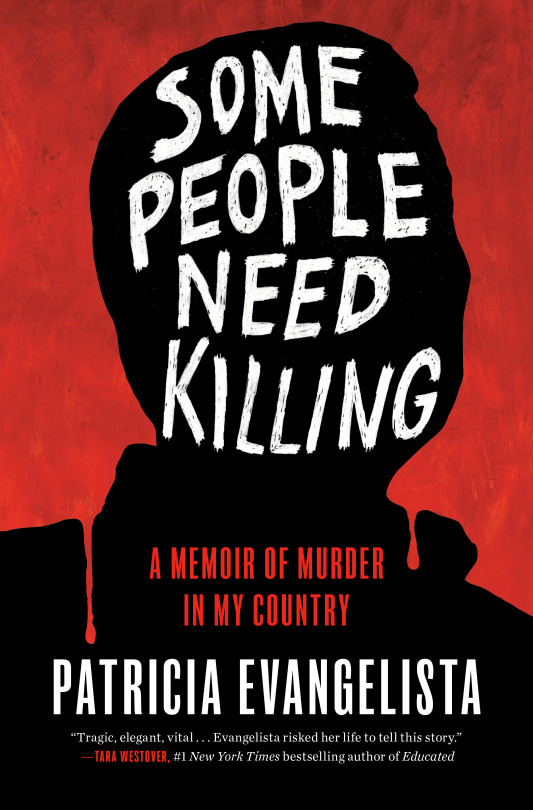
Title: Some People Need Killing: A Memoir of Murder in My Country
Author: Patricia Evangelista
Genre/s: nonfiction, history, politics, crime, journalism
Content/Trigger Warning/s: journalistic depictions and discussions of crimes such as murder, kidnapping, and rape, as well as natural disasters, including the effects of Typhoon Haiyan (PH name Yolanda)
Summary (from publisher's page): “My job is to go to places where people die. I pack my bags, talk to the survivors, write my stories, then go home to wait for the next catastrophe. I don’t wait very long.”
Journalist Patricia Evangelista came of age in the aftermath of a street revolution that forged a new future for the Philippines. Three decades later, in the face of mounting inequality, the nation discovered the fragility of its democratic institutions under the regime of strongman Rodrigo Duterte.
Some People Need Killing is Evangelista’s meticulously reported and deeply human chronicle of the Philippines’ drug war. For six years, Evangelista chronicled the killings carried out by police and vigilantes in the name of Duterte’s war on drugs—a war that has led to the slaughter of thousands—immersing herself in the world of killers and survivors and capturing the atmosphere of fear created when an elected president decides that some lives are worth less than others.
The book takes its title from a vigilante whose words seemed to reflect the psychological accommodation that most of the country had made: “I’m really not a bad guy,” he said. “I’m not all bad. Some people need killing.”
A profound act of witness and a tour de force of literary journalism, Some People Need Killing is also a brilliant dissection of the grammar of violence and an important investigation of the human impulses to dominate and resist.
Buy Here: https://bookshop.org/p/books/some-people-need-killing-a-memoir-of-murder-in-my-country-patricia-evangelista/19968748
Spoiler-Free Review: Okay, so. I already had this in my TBR and was planning to read it in some vague point in the future, but a close friend of mine picked it up and mentioned it in a tweet. Since I was midway through Mona Awad’s Rouge at the time, I promised to give it a shot once I was done with that. The finishing of THAT book got further delayed because Paladin’s Faith got released and I had to read THAT, then continued with Rouge to finish it. When it was all said and done though I picked this up and got stuck in.
Now just to be clear: I am Filipino, have lived in the Philippines all my life, and am lucky enough to live a privileged life by the standards of my country. I didn’t vote for Rodrigo Duterte in the 2016 elections because I liked neither his politics nor his values, and I certainly didn’t like the stories I’d read in the news about the Davao Death Squad, and so was one of many people who felt that sucking wave of dread when it was announced he’d won.
What followed was a nightmare I was lucky enough to view from a distance (afforded to me by my aforementioned privilege), and through the hazy fog of slow-rolling grief because of my mother’s cancer diagnosis, treatment, and death in the following years. I didn’t see all the news reports, but I did see the reactions on social media. One of the earliest ones was #CardboardJustice, which was started by my friend Hope Swann, and then popularized by Adrienne Onday. It was a response to how many murder victims had been turning up with a piece of cardboard attached to them with the statement “Pusher ako” (”I am a [drug] pusher”), as if that would justify their slaughter to those who came upon the victim’s body, as if all that was needed to pronounce one guilty of drug pushing was to have a cardboard sign saying so on one’s person. #CardboardJustice was one of the first grassroots movements pushing back against the drug war, and it was adopted quite widely in the latter end of 2016 and early into 2017.
Another one that sticks out in my mind is #Tumindig (”Stand Up”), which was inspired by the artwork of the same name by Kevin Eric “Tarantadong Kalbo” Raymundo. That artwork, released in 2021, was in response to Duterte’s handling of the COVID-19 pandemic, but also to his government’s half-dozen years of murder, red-tagging, and censorship. Like #CardboardJustice, #Tumindig inspired a movement, especially among other artists - and it was still popular enough by the time the 2022 national elections rolled around to be used by those supporting Leni Robredo’s presidential campaign. #CardboardJustice and #Tumindig - one emerging from the first year of the Duterte presidency, the other from its last - bookend six years of continuous pushback against him and his government.
But what’s puzzling is, there wasn’t any mention of this in Evangelista’s book. And even if she was unaware of those specific movements, surely she was aware of the many other grassroots movements that emerged throughout Duterte’s presidency? People from all walks of life protested against Duterte from before the beginning of his regime, all the way to the end, and even beyond. Why was no mention made of these efforts to push back? My assumption, of course, would be that any mention of these movements was left out for the sake of keeping the book’s narrative and subject matter focused, but if there was room for Evangelista’s personal stories, why was there no room to tell, even in brief, the stories of those who protested and fought back? The concepts of “lumaban” and “nanlaban” are key themes in this book, so why didn’t Evangelista even nod to the protests and protesters?
I would hope that readers, especially foreign readers, will know better than to assume that ALL Filipinos approved of what Duterte was doing, but a part of me is too cynical (especially where white Westerners are concerned) to believe that will be the case. Worse, they might assume that the masa (”the masses”) were uniformly duped into voting for him. So let me say, here and now: many Filipinos from all walks of life saw through Duterte and knew him for what he was. We didn’t vote for him, and we fought back, each in our own way, all throughout his presidency. Some of us - students, activists, social workers, journalists, and many more - were killed, or disappeared, becoming the desaparecidos (”the disappeared”) of the Duterte regime. Many were not directly targeted, but fled due to the dire circumstances both economic and social produced by his regime, looking for better and safer work and living conditions elsewhere. And many of us continue to fight back today.
As for Evangelista herself, her personal stories are scattered all throughout this book, though they are most present at the beginning. While I don’t think there’s really anything wrong with the inclusion of such stories (not least because “memoir” is right there in the book’s subtitle), I kind of found myself sliding through them more quickly as I sought out the more journalistic material on the drug war. It’s not that Evangelista’s personal story isn’t INTERESTING, per se, but I think it would be more interesting to foreigners, who didn’t witness the drug war in real time like most Filipinos did.
Overall I think this is a pretty important read - or, at least, for foreigners: for anyone who, as I said, didn’t see the drug war happening in real time, in front and all around them. And for the most part, it certainly reads like it's aimed at that specific audience, shining a light on events that the rest of the world probably didn’t know about, or only understood peripherally. It’s timely too, considering the ICC case against Duterte plus who the current President and Vice President are. But for those of us who WERE here to witness the drug war, who had to live with Duterte running the country for six entire years and feared he’d declare martial law and rule us for much longer - this book might feel a bit lacking in some areas, not least the coverage of the many protests across those six years. Many people did what they could to fight back - some even disappeared, or were killed, or had to go into hiding or flee to protect themselves and/or those closest to them. It would have been nice to see them get even some coverage in this book.
Rating: four bullets
#book review#book reviews#some people need killing#patricia evangelista#nonfiction#journalism#history#politics#crime#books#filipino history#filipino politics#filipino literature#filipino author
8 notes
·
View notes
Text
Banning Transgender Conversion Practices: A Legal and Policy Analysis by Florence Ashley
goodreads
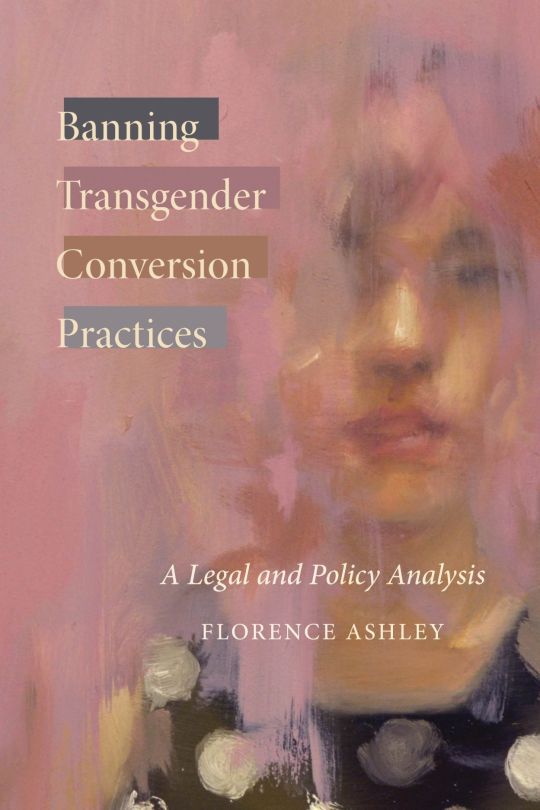
Survivors of conversion practices—interventions meant to stop gender transition—have likened their experiences to torture. In the last decade, bans on these deeply unethical and harmful processes have proliferated, and governments across the world are considering following suit. Banning Transgender Conversion Practices considers the pivotal concerns for anyone studying or working to prevent these harmful interventions. What is the scope of the bans? How do they differ across jurisdictions? What are the advantages and disadvantages of legislative approaches to regulating trans conversion therapy? In answering these questions, Florence Ashley demonstrates the need for affirmative health care cultures and detailed laws. Banning Transgender Conversion Practices centers trans realities to rethink and push forward the legal regulation of conversion therapy, culminating in a carefully annotated model law that offers detailed guidance for legislatures and policymakers.
Mod opinion: I haven't read this book yet, but it sounds like a very important book.
#banning transgender conversion practices#florence ashley#polls#trans books#trans lit#trans literature#lgbt lit#lgbt literature#lgbt books#politics#nonfiction
7 notes
·
View notes
Text

“Kasuri also gives us a rare insight into the minds of the Pakistan Army, the contribution of the Foreign Office and his warm but complex relationship with President Musharraf. Blending analysis with choice anecdote, Neither a Hawk nor a Dove gives us a comprehensive and revealing account of Pakistan’s politics and the political compulsions of those at the helm.” 🌱
#khurshid mahmud kasuri#neither a hawk nor a dove#viking books#nonfiction#pakistan#foreign policy#diplomacy#india#indo pak#india pakistan#kashmir#kodak#south asia#dark academia#light academia#dark acadamia aesthetic#light acadamia aesthetic#studyblr#booklr#vintage#thrift#old books#second hand#political science#international relations#poli sci#mine#chai#study blog#book blog
4 notes
·
View notes
Text
Read -> Reading -> To-Read
An inside look at what's on librarian Beth's shelf lately:

Read: Happy Place by Emily Henry
I'm at the point that Emily Henry is on my list of to-read anytime she has a new book come out! Full of sweet and hilarious scenarios, her books are must-reads for those enjoying a quirky romance with lots of feels. Happy Place did not let me down!
Reading: The Queen of Dirt Island by Donal Ryan
I just started this one which was recommended to me by a co-worker and is set in Tipperary, Ireland, so clearly it belonged on my TBR list!
To Read: I Swear Politics is Messier than my Minivan by Katie Porter
I don't know anything about Representative Katie Porter but the title got me. As a minivan driver and someone who tries to be civically-minded, this seems like it will be a humorous but realistic look at what goes on in Congress by someone who is "one of us."
See more of Beth's recs
#happy place#emily henry#donal ryan#katie porter#i swear politics is messier than my minivan#the queen of dirt island#nonfiction#adult fiction#TBR pile#book recommendations#bookblr#romance#booklr#read reading to-read#LCPL recs#beth's recs
9 notes
·
View notes